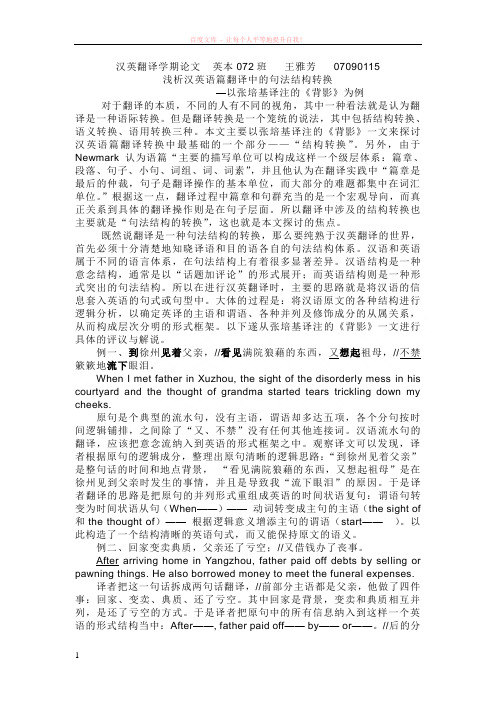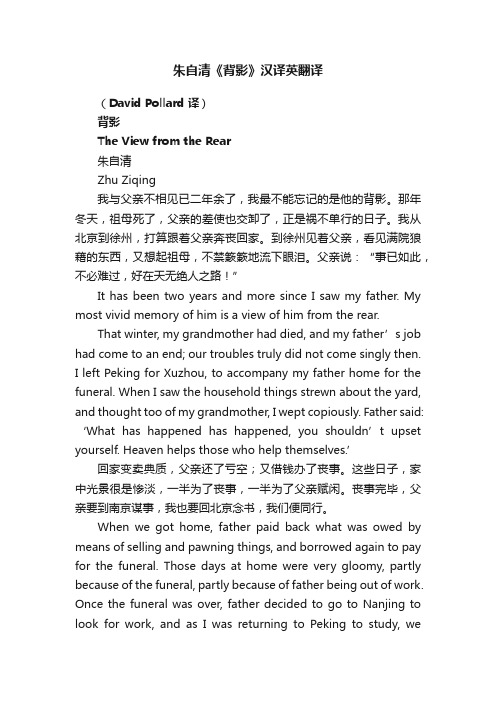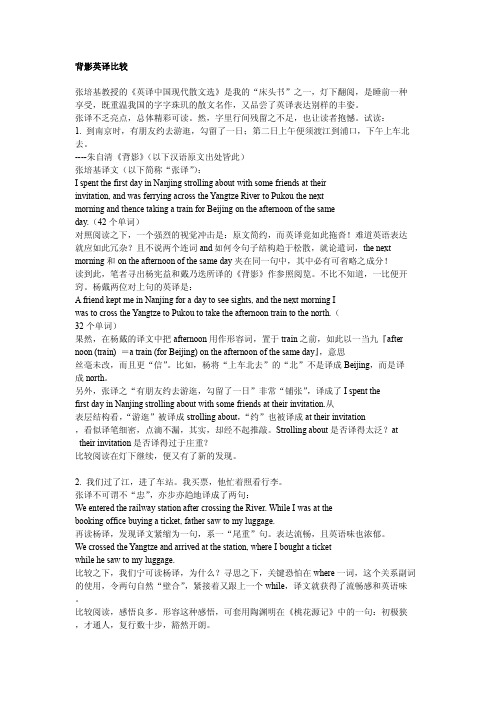英汉翻译动静态比较以背影为例
汉英翻译学期论文浅析汉英语篇翻译中的句法结构转换—以张培基译注的背影为例 (1)

汉英翻译学期论文英本072班王雅芳07090115浅析汉英语篇翻译中的句法结构转换—以张培基译注的《背影》为例对于翻译的本质,不同的人有不同的视角,其中一种看法就是认为翻译是一种语际转换。
但是翻译转换是一个笼统的说法,其中包括结构转换、语义转换、语用转换三种。
本文主要以张培基译注的《背影》一文来探讨汉英语篇翻译转换中最基础的一个部分——“结构转换”。
另外,由于Newmark 认为语篇“主要的描写单位可以构成这样一个级层体系:篇章、段落、句子、小句、词组、词、词素”,并且他认为在翻译实践中“篇章是最后的仲裁,句子是翻译操作的基本单位,而大部分的难题都集中在词汇单位。
”根据这一点,翻译过程中篇章和句群充当的是一个宏观导向,而真正关系到具体的翻译操作则是在句子层面。
所以翻译中涉及的结构转换也主要就是“句法结构的转换”,这也就是本文探讨的焦点。
既然说翻译是一种句法结构的转换,那么要纯熟于汉英翻译的世界,首先必须十分清楚地知晓译语和目的语各自的句法结构体系。
汉语和英语属于不同的语言体系,在句法结构上有着很多显著差异。
汉语结构是一种意念结构,通常是以“话题加评论”的形式展开;而英语结构则是一种形式突出的句法结构。
所以在进行汉英翻译时,主要的思路就是将汉语的信息套入英语的句式或句型中。
大体的过程是:将汉语原文的各种结构进行逻辑分析,以确定英译的主语和谓语、各种并列及修饰成分的从属关系,从而构成层次分明的形式框架。
以下遂从张培基译注的《背影》一文进行具体的评议与解说。
例一、到徐州见着父亲,//看见满院狼藉的东西,又想起祖母,//不禁簌簌地流下眼泪。
When I met father in Xuzhou, the sight of the disorderly mess in his courtyard and the thought of grandma started tears trickling down my cheeks.原句是个典型的流水句,没有主语,谓语却多达五项,各个分句按时间逻辑铺排,之间除了“又、不禁”没有任何其他连接词。
英汉静态与动态对比

试比较:
You are a terrible liar.
你谎话说得太差劲.
His very appearance at any affair proclaims it a triumph
无论什么事情,只要他一露面,就算是成功了。 He admires the President’s stated decision to fight for the job.
英语中,名词化是一种常见的语言现象
英语名词化简单说来即英语偏重使用名词,即所谓“名词 优势于动词”(preponderance of nouns over verbs) 。 英语趋向于用名词来表达原来属于动词 (或形容词) 所表 达的概念。
She succeeded in this match , so she felt encouraged (这次比赛她获胜了,因而很受鼓舞) . 从英语修辞效果上看,它更多是用以下简单句结 构表达: Her success in this match served as great encouragement to her.
A. 由动词的派生词名词(或含有动作意义的 名词)转译为动词
An acquaintance of world history is helpful to the study of translation.
读一点世界史,对学习翻译是有帮助的。
A view of Mt. E-mei can be obtained from here.
汉语中介词使用较少。汉语的介词多数是动词变来的,并 与动词兼类,即介词可以充当句子的谓语,成了动词,即 所谓“反介为动”现象。实际上,这种现象主要是因为汉 语的词性和句法成分不是一一对应的关系。 如,在汉语句子中,“窗户朝南”中“朝”被理解为动词 ,而“窗户朝南开”中,“朝”被理解为介词。现代汉语 有“介词”这一词类,但依然认为“大多数介词是由动词 虚化而来的,因此介词的语法特征还与动词有某些相似之 处”。可见,汉语的介词并不多,即使在某些语境下将之 归类为介词,依然保留着很强的动作性。
英语翻译中的形合意合——以张培基所译朱自清《背影》为例

为 ,所 以”表现 出来 了。然而 ,在 汉语 中,我们也可 以
说: “ 走 累 了 ,休 息 一 下 。 ” 这 句 话 中 , 虽 然 没 有 明 确 连 接 词 表 明相 互 关 系 ,但 通 过 逻 辑 纽 带 ,这 种 关 系 依 然
如演讲中 “ 有时候……有时候…… ” , “ 鸟儿 不 理 我 ,树 也 不理我 。 ”构 成 反 复 结 构 ,英 语 译 文 用 “ s o me t i me s ”“ a t t i me s ” 两个 不 同 的关 联词 巧妙 连 接 。 3 . 3英译汉语 四字词组 中关联词的隐与显 四字词组 具一格 的特 点 ,深刻 反映 出汉语 意合的语言特 是汉语独 征 它 能 形 象 地 表 现 出 丰 富 的蕴 含 和 指 称 意义 充分表现 汉字 的美 感 。在英译 四字格词 组时 ,通 常也要添加关联词 以显现汉语 中隐含的语义关系 。 6 a . 起 初她有些不耐烦,因为在她心 目中,说书人都 是 油 嘴 滑 舌 、不 务 正 业 的人 。
形合 与意合是 英汉两种语 言最大 的差异 。汉 语重意
合
,
汉 语 四字词 组在 “ 诺 贝尔演 讲 ”中 出现 得 比较 多, 葛浩文英译 时采用不 同的策略 。 6 a 中 “ 不务 正业 ”被译成 ‘ 。 i n a d u b i o u s p r o f e s s i o n ” ,运 用 介 词 词 组 , 巧 妙地 与前 面 连 接 起 来 又没 有 丝 毫 牵 强 之意 。又 如 “ 诺 贝尔 演 讲 ” 中文 文本 中, “ 添油加醋 ”被译为 “ e m b e l l i s h i n g m y n a r r a t i o n ” ,没
,
,
朱自清《背影》汉译英翻译

朱自清《背影》汉译英翻译(David Pollard 译)背影The View from the Rear朱自清Zhu Ziqing我与父亲不相见已二年余了,我最不能忘记的是他的背影。
那年冬天,祖母死了,父亲的差使也交卸了,正是祸不单行的日子。
我从北京到徐州,打算跟着父亲奔丧回家。
到徐州见着父亲,看见满院狼藉的东西,又想起祖母,不禁簌簌地流下眼泪。
父亲说:“事已如此,不必难过,好在天无绝人之路!”It has been two years and more since I saw my father. My most vivid memory of him is a view of him from the rear.That wi nter, my grandmother had died, and my father’s job had come to an end; our troubles truly did not come singly then.I left Peking for Xuzhou, to accompany my father home for the funeral. When I saw the household things strewn about the yard, and thought too of my grandmother, I wept copiously. Father said: ‘What has happened has happened, you shouldn’t upset yourself. Heaven helps those who help themselves.’回家变卖典质,父亲还了亏空;又借钱办了丧事。
这些日子,家中光景很是惨淡,一半为了丧事,一半为了父亲赋闲。
丧事完毕,父亲要到南京谋事,我也要回北京念书,我们便同行。
英汉对比静态与动态

英语—静OR动?
1. Admittance Free 免票入场
2. Out of Bounds 游客止步
3. No Admittance Except on Business 闲人免进
4. Danger of Death – High Voltage! 高压危险!
英语-静态STATIVE
4.静态- VERB- WEAKEN
❖动词的弱化:使用动词意味最弱的to be, 包括it be, there be, must be, maybe, should have been
一场热带风暴袭击了佛罗里达东海岸 A tropical storm lashed the east coast of Florida. There was a tropical storm off the east coast of Florida
3.静态-PREPARATION- PROMINENT
❖ 英语常用介词短语代替动词短语,即“以静代动”
1)他们立刻出动去追击敌人。 They immediately set out in pursuit of the enemy. 2)有人给他撑腰。 He has someone behind him. 3)他在读书。 He is at his books. 4)机器正在运行。 The machine is in operation 5) 说完这些话,她便走开了。 With these words, she went away.
静态STATIVE-英语
1.名词化Nominalization 2.施事名词Agentive nouns in place of verbs. 3.介词Preparation- Prominent 4.动词弱化Verbs-weaken 5.形容词与副词Ajectives and adverbs in place of verbs
从张培之英译本《背影》比较英汉语言的异同

ywjszxk@朱自清的《背影》创作于1925年,当时朱自清还在求学阶段。
由于祖母过世,他从北京回到徐州,帮助父亲料理丧事。
那时父亲正处在失业状态,靠变卖家当维持生计。
处理完丧事之后,父亲要去南京谋事,与儿子一道到南京。
面对已经二十岁的儿子,父亲仍将他当作幼儿,要亲自送他上火车,一路上谆谆叮嘱。
儿子临上车,父亲还要去买橘子给儿子带着在路上吃。
他拖着胖胖的身体爬月台,越过铁道,只为了让儿子在路上有橘子吃。
儿子远远看着父亲臃肿的背影,深深被父亲的舐犊之情感动。
这是一篇表现父子亲情的著名作品,语言朴实无华,却情感真切,成为现代文学作品中的经典。
张培之的英译本《背影》抓住了这个特点进行翻译,也成为英译本中的经典。
汉语和英语产生于不同的文化背景,语法差异较大。
英语语法讲究形合,汉语讲究意合;英语在表述时以静态为主,汉语却以动态为主;汉语有隐性表达的习惯,而英语却擅长显性表达;汉语以重复作为修辞,而避免重复是英语的主要句法特征。
张培之在翻译《背影》时,就尽量做到用英语表达方式来表现文章中的父子情。
一、英语的形合和汉语的意合英语和汉语在语言表达上有很大区别,英语注重形合,语言有主次之分,语句具有逻辑性强、连贯的特点;汉语的表达重在意合,语句显得散漫,常常省略主语和句子中的连词。
在翻译中,为了完整表达语言的含义,必须将这些省略的部分补充完整。
原文中有这样一句:“回家变卖典质,父亲还了亏空。
”从语法上分析,这句话缺少主语,应该是“父亲回到扬州的家”,两句话之间还存在逻辑问题,应该是“父亲通过变卖典质,才还清了亏空”。
张培之在英译本中将缺少的主语补上,还调整了语序,使语句变得更加符合逻辑:“The father went back to his home in Yangzhou and paid off the debt by selling his legacy.”(父亲回到扬州家中,用变卖遗产的方式,还清了债务。
背影英译比较

英汉对比静态与动态

5.静态-ADJ&ADV.IN PLACE OF VERBS
❖使用动词的同源形容词与弱化动词相结合的方式表达动词的意义
英汉语言对比 静态与动态
英语—静OR动?
1. Admittance Free 免票入场
2. Out of Bounds 游客止步
3. No Admittance Except on Business 闲人免进
4. Danger of Death – High Voltage! 高压危险!
英语-静态STATIVE
3.静态-PREPARATION- PROMINENT
❖ 英语常用介词短语代替动词短语,即“以静代动”
1)他们立刻出动去追击敌人。 They immediately set out in pursuit of the enemy. 2)有人给他撑腰。 He has someone behind him. 3)他在读书。 He is at his books. 4)机器正在运行。 The machine is in operation 5) 说完这些话,她便走开了。 With these words, she went away.
4.静态- VERB- WEAKEN
❖动词虚化: 把动词转化或派生成名词,置于虚化动词(have, make, take, do)之后做其宾语,如have a look, take a walk, make attempts, pay visits, do some damages, put up a proposal
- 1、下载文档前请自行甄别文档内容的完整性,平台不提供额外的编辑、内容补充、找答案等附加服务。
- 2、"仅部分预览"的文档,不可在线预览部分如存在完整性等问题,可反馈申请退款(可完整预览的文档不适用该条件!)。
- 3、如文档侵犯您的权益,请联系客服反馈,我们会尽快为您处理(人工客服工作时间:9:00-18:30)。
Stativeness and Dynamicity between Chinese and EnglishA case study of zhang Peizhi's English version of Figure.Generally speaking,a stative language,like English,in order to stress concepts or states ,must rely heavily on nouns and nominal expressions,Such as nouns, prepositions, adjectives, etc.whereas a dynamic language ,like Chinese,which emphasizes motions or actions,would find more expressions in verbs and verbal patterns.This paper will make a comparative study of the static and dynamic characteristics in English-Chinese translation of the original figure and zhang Peizhi's English version of Figure.1. Nominalization is one of the features of English static languageEnglish, especially written language, is highly static and has its own unique preferences in the choice of parts of speech. Nouns are most frequently used in written language. If you us e a verb in a Chinese sentence, use a noun in English1.1 When I met father in Xuzhou, the sight of the disorderly mess in his courtyard and the thought of grandma started tears trickling down my cheeks.到徐州见着父亲,看见满院狼藉的东西,又想起祖母,不禁簌簌地流下眼泪。
1.2 I spent the first day in Nanjing strolling about with some friends at their invitation, and was ferrying across the Yangtse River to Pukou the next morning and thence taking a train Tor Beijing on the afternoon of the same day.到南京时,有朋友约去游逛,勾留了一日;第二日上午便须渡江到浦口,下午上车北去。
In example 1.1 ,“看见” was translated into ” the sight of”,“想到” was translated into ”the thought of” ,“看见” and “想到” were translated into ”sight” and “thought”as nouns in English.But in Chinese ,”sight” and “thought” were verbs in sentence 1.1.In example 1.2,”游逛”is translated into ”at their invitation”.”游逛”was a verb in Chinese,”invitation” is a noun in English.These examples explains the nominalization of English as a static language well. Nouns are used more often than verbs in English sentences.As a dynamic language, Chinese usually uses verbs.2.The frequent use of adjectives is one of the characteristics of English as a static language 2.1 He told me to be watchful on the way and be careful not to catch cold at night.他嘱我路上小心,夜里要警醒些,不要受凉2.2 After the funeral was over, father was to go to Nanjing to look for a job and I was to return to Beijing to study, so we started out together.丧事完毕,父亲要到南京谋事,我也要回北京念书,我们便同行。
In example 2.1,”小心” was translated into “be watchful ”.”不要受凉”means”避免受凉” in Chinese. “不要” was translated into “ be careful not”.In example 2.2,”完毕”was translated into “was over”.”watchful”,”careful” and “over” are adjectives in English.They are used separately instead “小心”,”不要”and “完毕” .In Chinese.It is common to replace Chinese verbs with adjectives in English. This is also one of the characteristics of English as a static language .3.The frequent use of adverbs is one of the characteristics of English as a static language3.1I quickly wiped them away lest he or others should catch me crying.我赶紧拭干了泪。
怕他看见,也怕别人看见。
3.2When I met father in Xuzhou,the sight of the disorderly mess in his courtyard and the thought of grandma started tears trickling down my cheeks.到徐州见着父亲,看见满院狼藉的东西,又想起祖母,不禁簌簌地流下眼泪。
In example 3.1,“拭干眼泪” was translated into “wiped them away”.the word “away” is an adverb.but in Chinese,“拭干”is a verb.In example3.2,”流下眼泪” was translated into “ tears trickling down”.”down” is an adverb in English.In English sentences,Chinese verbs are replaced by adverbs .This is one feature of English as a static language.4.In English-Chinese translation, English verbs are also used to translate Chinese4.1In crossing the railway track, he first put the tangerines on the ground, climbed down slowly and then picked them up again.过铁道时,他先将橘子散放在地上,自己慢慢爬下,再抱起橘子走。
4.2 His hands held onto the upper part of the platform, his legs huddled up and his corpulent body tipped slightly towards the left, obviously making an enormous exertion.用两手攀着上面,两脚再向上缩;他肥胖的身子向左微倾,显出努力的样子。
In example 4.1,”放”,“爬”and“抱”was translated into “ put”,”climbed” and”picked”.And in example 4.2,”攀” ,”缩”and”倾” was translated into “held”,”huddled” and “tipped”.In English,“ put”,”climbed” ,”picked”,“held”,”huddled”and “tipped”are verbs.In example 4.1 and example 4.2.,the Chinese verb was translated using the English verb.The translation of Chinese verbs using English verbs is also one of the characteristics of English as a static language .5.Prepositions are often used to replace Chinese verbs in English translations5.1 Between grandma's funeral and father's unemployment, our family was then in reduced circumstances.这些日子,家中光景很是惨澹,一半为了丧事,一半为了父亲赋闲。
